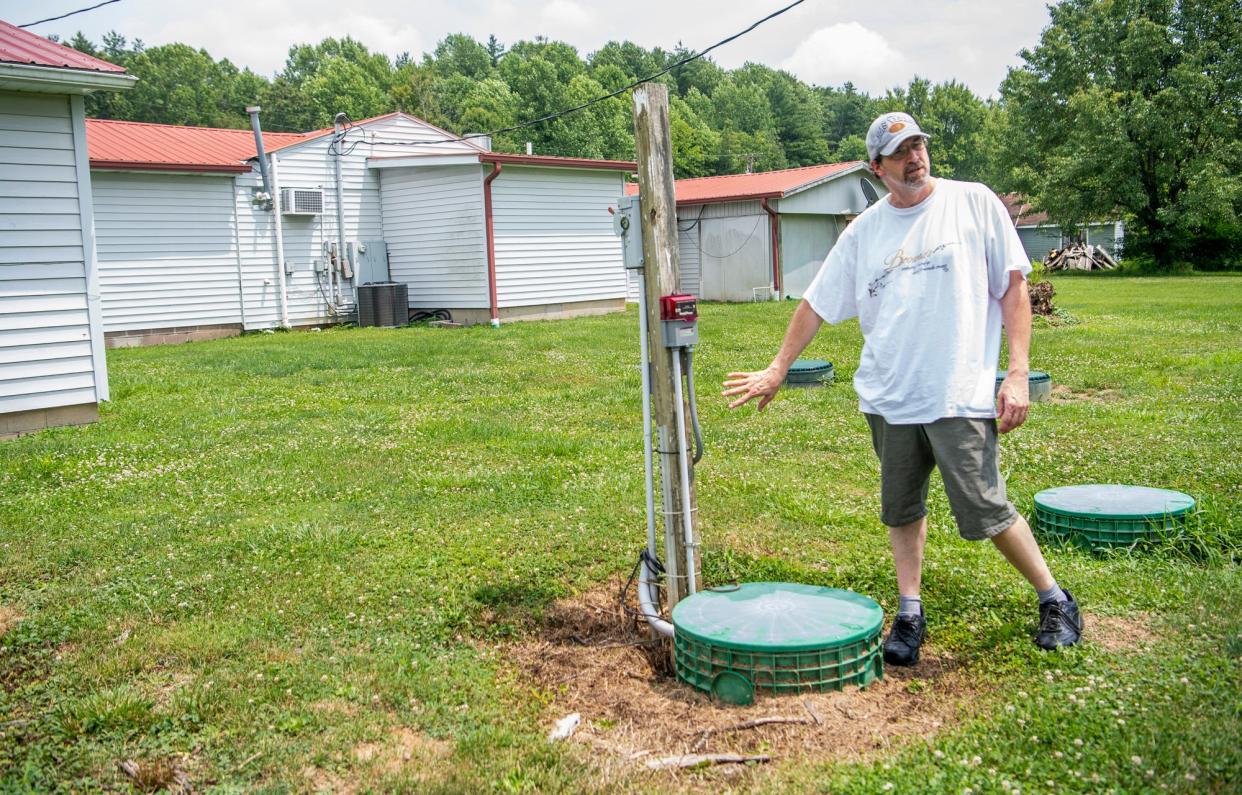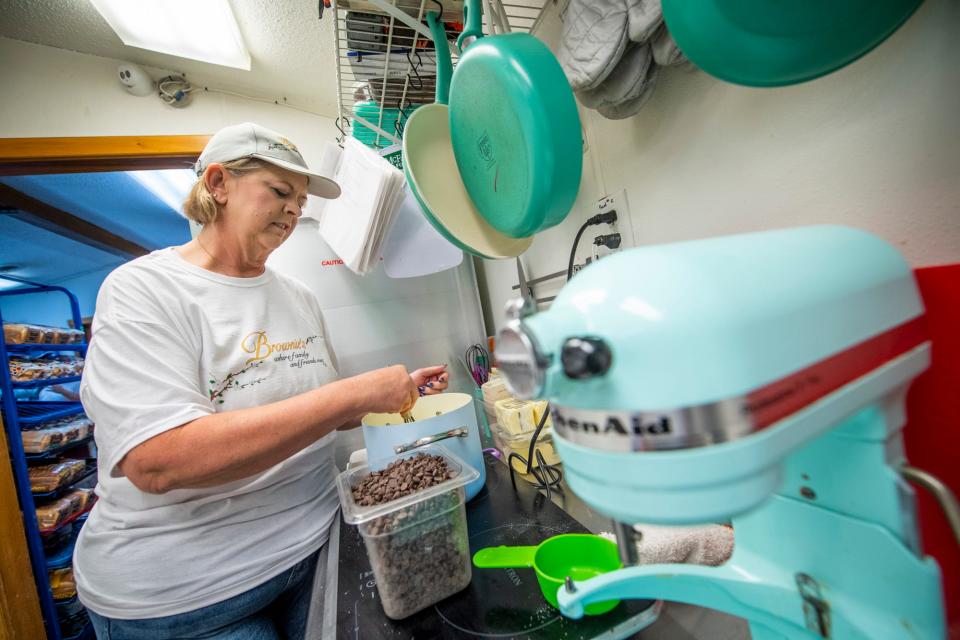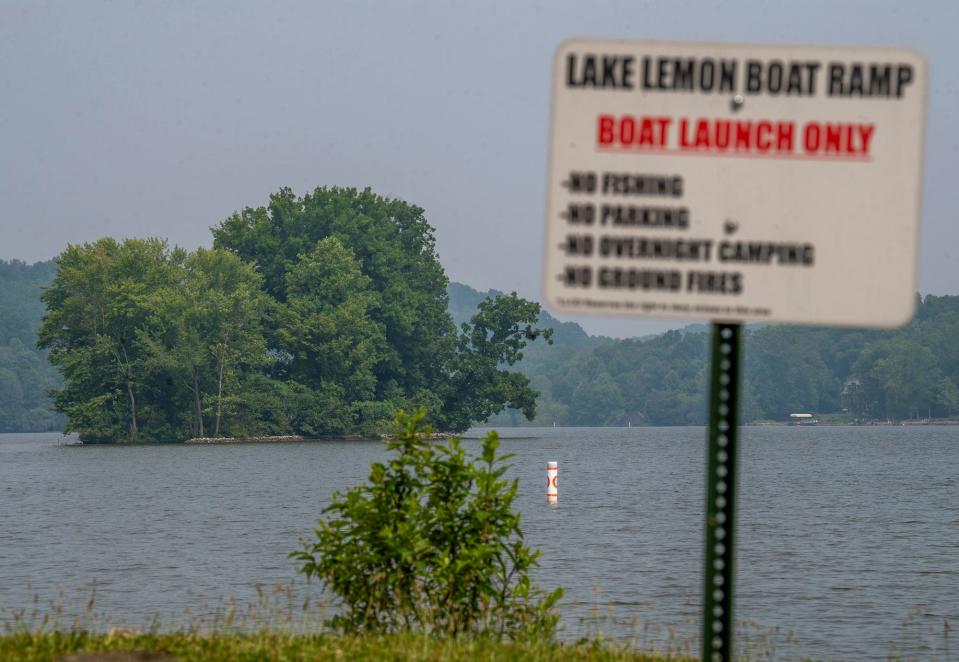Proposal to build sewer system serving Lake Lemon spurs hope, concern

About three or four days a week, Paul Lattimore hears an alarm go off at Brownie’s Family Restaurant in Brown County's Bean Blossom community. The sound signifies money going down the drain. Almost literally.
The restaurant’s two septic fields have failed, which means the grease and grime from the restaurant operation and water from the toilets slide into underground storage tanks that have to be pumped whenever Lattimore hears that alarm.
“If, at 7 o’clock, somebody goes and flushes the toilet and it sticks, that’s $600,” Lattimore said.
The failed septic systems and lack of a sewer hookup cost Lattimore and his wife, Tania, about $3,600 a month, taking a big bite out of their profits.
It’s part of why they’ve joined other business owners and residents in supporting a planned $30 million project — to be paid for primarily through state and federal dollars — that would run sewer lines over a roughly 10-mile stretch from Lake Lemon, in Monroe County, through Bean Blossom to Woodland Lake, in Brown County.
But the project also has laid bare competing interests among property developers, government officials and residents, some of whom oppose the project because they don’t think it’s necessary or because it threatens to spur the kind of development they’ve tried to escape by moving to bucolic settings in Brown and Monroe counties.
A long road to develop wastewater treatment
The project has been in the works for more than 20 years, and the Brown County Regional Sewer District — formerly known as the Bean Blossom Sewer District — still does not have a single customer or a single pipe in the ground. Local officials said the project is closer to fruition than ever, as a 400-plus page preliminary engineering report is now before state officials. However, they acknowledge the project is still in the early stages and even if everything runs smoothly, the first customers won't be able to hook up until 2026.
The Lattimores say access to a sewer system would help secure the future of Brownie’s, where patrons gather for company and the smothered-in-gravy Manhattans, the made-from scratch pies and Friday’s all-you-can-eat catfish.

The restaurant, on Ind. 135, a two-minute drive north of Greasy Creek Road, frequently greets guests who’ve come to the place for decades as well as first-time visitors who stop on their way to shop in nearby Nashville, Indiana, or peep at leaves in fall.
Bean Blossom boasts some churches, rolling hills, and lots of trees — the turning foliage attracts thousands of visitors. The town has only a handful of businesses: Brownie’s, a dollar store, a mobile home park, a veterinary clinic, an antique store and the famed Bill Monroe’s Music Park & Campground.
A history of failure and pollution
Below the community’s sylvan surface runs a dark secret — quite literally: Failing septic systems are causing sewage to leach into the ground and streams, which threaten to contaminate nearby bodies of water, including Lake Lemon.
Rex Voils, owner of the music park, said he hosted about 70,000 people last year, including about 5,000 at each of the six festivals. Voils, too, has to pay a contractor to pump and haul sewage. It costs him about $65,000 a year.
During the annual bluegrass festival, the pumper trucks show up three of the five days, Voils said. Spills are unavoidable. And it affects the visitors.
“There’s just no way you can keep that smell down,” he said. “It stinks up the whole (of) Bean Blossom.”
Bean Blossom resident Diana Biddle, a former county council member and county commissioner, summarized Bean Blossom’s problems: "The only person that makes money at the bluegrass festival is the guy who pumps the poop,” she said.
E. coli in Lake Lemon and tributaries
Sewer project proponents say leaking septic systems are contributing to poor water quality in streams and threaten the health of lakes including Woodland Lake in Brown County and Lake Lemon in Monroe County.
Clint Studabaker, vice president of the Brown County Regional Sewer District, said via email that Bean Blossom and Salt creeks and their tributaries have been listed as impaired for E. coli. And tests in 2020 at 31 locations showed they exceeded state recreational health standards a majority of the time.
Annual testing in Lake Lemon tributaries frequently show concentrations of E. coli above state health standards, but tests in the lake itself rarely rise above that threshold.

Adam Casey, district manager for the Lake Lemon Conservancy District, which manages the lake, said the beach on the lake’s south side, at Riddle Point Park, had to be closed only once in the last nine years because of high E. coli concentrations.
He said the lake shows elevated concentrations usually only after heavy rains wash contaminants off nearby farm fields.
A laboratory at Indiana University’s Paul H. O’Neill School of Public and Environmental Affairs conducts weekly testing at the beach and monitors six additional tributary sites to identify potential problems.
Sarah Powers, a research associate at the school, said the tributaries typically are tested twice each summer, including once after a rainfall to capture land runoff as well.
Powers said E. coli concentrations have declined in the lake and the tributaries, though some problem areas remain.
In 2018 and 2019, more than 80% of samples taken in the tributaries exceeded the health threshold. In 2020, only half of the samples exceeded the threshold. But the timing of the samples — before or after a rainfall — can make a huge difference. Some samples in 2020 barely exceed the threshold. But one sample, taken at Chitwood No. 1, on May 20, 2020, exceeded the state standard more than 50-fold. The Chitwood area is in the lake's southeast corner.
Studabaker said five samples analyzed in a laboratory near South Bend indicated more than half of the E. coli came from humans.
“We know that we have septic issues,” he recently told the Monroe County commissioners, who praised the district's efforts to provide sewer services.
However, Bean Blossom resident Jacob Adams said the samples were cherry picked and taken near a mobile home park notorious for its failing septic systems.
Adams said the samples are a good start, but in a watershed of 71 square miles, one should not draw conclusions from just a few samples. The project proponents should take more samples throughout the watershed to determine whether failing systems are the primary culprit of the contamination, he said.
Studabaker said the district plans to conduct follow-up sampling and analysis.
Adams said more samples also could pinpoint problem areas that may be mitigated without spending $30 million and forcing people to pay for a service they may not need and definitely don’t want.
Adams, who works for the state and moved to the area four years ago, also said septic systems don’t necessarily fail because they’re old. If people take care of them properly, the systems can function for decades.
If sewer system is built, homeowners will have to connect
If sewer lines were laid from Lake Lemon to Woodland Lake, residents whose property line is near the sewer line will be required to hook up, unless they have a fairly new septic system that functions properly. Adams, 37, said residents may even have to pay a monthly fee during construction and perhaps for years before they could take advantage of the service.
Many of his neighbors don’t want the service, and some of them are on fixed incomes and will struggle to pay an extra monthly bill, he said.
Studabaker said state law allows bills to be collected during construction to meet interest on the revenue bonds and other expenses. But he said the project is still in the early stages, and the project's scope, as well as its costs, funding sources and rate analysis "are under development."
Paul Nelson, a 70-year-old retired commercial printer who lives at Woodland Lake, also opposes the sewer project.
He said his septic system is in good shape and he doesn’t believe he’ll need to hook up to a sewer system. And he agrees with Adams that the origins of the contamination in streams has not been properly investigated.
Jerry Pittman, president of the Brown County commissioners, acknowledged that no one has conducted a study to determine how many of the septic systems are failing, but he said tests show that some definitely are.
The Brown County Health Department gets about a dozen complaints a year about failing systems, usually from neighbors who see sewage leaking onto their properties, said Ernie Reed, an environmental health specialist with the department. The complaints prompt an inspection, though only with the property owner’s permission. If the property owner balks, the department has to get a court order.
According to the sewer district's engineering report, 40% of the households in the Bean Blossom watershed do not have any records for their septic systems. Of those that do, 59% have systems that are more than 20 years old. A quarter are more than 30 years old.
Pittman said it’s not unreasonable to surmise that a lot of the septic systems are likely failing already or soon will.
Sewer hookups to spur development?
Biddle, the former county official, said failing septic systems are such a problem in Bean Blossom that the town has lost residents and businesses.
She said the town used to have several gas stations and grocery stores, grain mills, a schoolhouse and an eyeglasses factory.
“Bean Blossom is a shell of what it used to be,” Biddle said.
Biddle, Pittman and Brown County Council President Gary Huett envision sewer hookups will allow for more residential buildings on smaller lots and the creation of new businesses to broaden the county’s tax base.
The public officials said sewer hookups would turn property along Ind. 135 into prime real estate for businesses that cater to tourists traveling from the Indianapolis area to Nashville.
Monroe County Commissioners President Penny Githens said she believes sewer hookups at Lake Lemon could spur some much-needed residential developments.
However, the prospect of more development is causing some unease among some of the project’s opponents — as well as some of the supporters.

Casey, the manager at Lake Lemon, said the majority of the lake’s residents support the sewer project because they believe it would improve the environment and increase their property values — but they worry about more residential development, especially multifamily housing that they fear could disrupt the lake’s tranquility.
Nelson, who opposes the project in general, said he wouldn’t mind some additional development in Bean Blossom, especially a Chinese restaurant, for which he usually has to drive to Columbus.
But Adams said a lot of people move to Brown County precisely to get away from urban development. To him it feels like the project is being pushed by government officials and property developers who stand to gain financially or politically while forcing an extra bill on people who can scarcely afford it.
“For us to kind of suffer … so that a handful of people can get what they want is, I think, not right,” he said.
In addition, Adams said, the proponents' hope for more development seems to undermine their professed interest in the project’s environmental benefits.
Studabaker said the project "has nothing to with development."
"The project is being driven by an overwhelming need for improving environmental water quality and public health and safety concerns for residents and their families," he said.
The level of support at public meetings has "clearly outpace the opposition," Studabaker said.
And Tania Lattimore, the Brownie’s restaurant co-owner, said opposition to more development is short-sighted, because without families moving into the area, there’s nobody to work even at the few businesses that remain, some of which already have to close some days for lack of staff.
Lattimore said the need for additional development is, for Bean Blossom, a matter of survival.
“This place eventually is going to die, because we just don’t have the people,” she said.
Boris Ladwig can be reached at bladwig@heraldt.com.
This article originally appeared on The Herald-Times: If built Brown County sewer district would serve Lake Lemon

